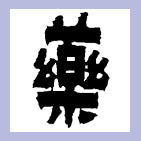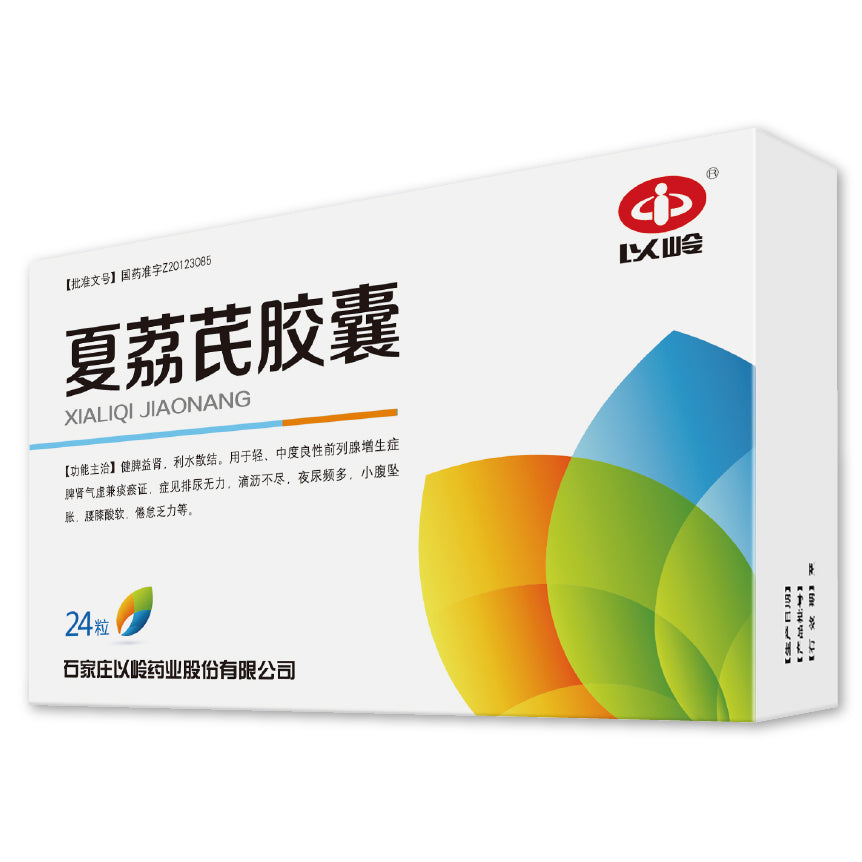Shijiazhuang Yiling Pharmaceutical Co., Ltd
夏荔芪胶囊, Xialiqi Jiaonang, Xia Li Qi Jiaonang, 24 capsules, for Mild to Moderate Benign Prostatic Hyperplasia with Spleen-Kidney Qi Deficiency and Phlegm-Stasis Syndrome
夏荔芪胶囊, Xialiqi Jiaonang, Xia Li Qi Jiaonang, 24 capsules, for Mild to Moderate Benign Prostatic Hyperplasia with Spleen-Kidney Qi Deficiency and Phlegm-Stasis Syndrome
无法加载取货服务可用情况
Drug Name
Xia Li Qi Jiaonang
Xialiqi Jiaonang
Xialiqi Capsules
Ingredients
Astragalus membranaceus, Ligustrum lucidum, Talcum, Prunella vulgaris, Litchi seed, Amber, Cinnamomum cassia, Phellodendron amurense
Description
This product is a hard capsule with brown to dark brown granules as contents; slightly aromatic in odor and bitter in taste.
Actions and Indications
Tonifying spleen and kidney, promoting diuresis and resolving masses. Used for mild to moderate benign prostatic hyperplasia (BPH) with spleen-kidney qi deficiency and phlegm-stasis syndrome, characterized by weak urination, dribbling incontinence, frequent nocturia, abdominal distension, soreness and weakness of the waist and knees, fatigue, etc.
Specifications
0.45g per capsule
Dosage and Administration
Oral administration. 3 capsules each time, 3 times daily. 4 weeks as one treatment course.
Adverse Reactions
Individual patients may experience gastric discomfort after administration.
Contraindications
Contraindicated in patients with hypersensitivity to any ingredient of this product.
Precautions
- Avoid greasy and rich foods.
- Not indicated for patients with residual urine volume >150ml or those who failed invasive treatments for BPH.
Clinical Trials
This product was approved for clinical research by the State Food and Drug Administration on July 14, 2005. Phase II and III clinical trials were conducted from December 2005 to February 2007. The trials evaluated the efficacy and safety of Xia Li Qi Jiaonang for BPH with spleen-kidney qi deficiency and phlegm-stasis syndrome using a randomized, double-blind, double-dummy, positive-controlled, multicenter design. The control drug was Qianlie Shule Granules. Phase II trials included 240 cases (120 in the test group, 120 in the control group); Phase III trials included 440 cases (330 in the test group, 110 in the control group).
Inclusion Criteria:
- Diagnosis of BPH with a disease course >3 months
- TCM syndrome differentiation of spleen-kidney qi deficiency and phlegm-stasis
Drug Administration:
- Test group: Xia Li Qi Jiaonang (3 capsules, tid) + Qianlie Shule placebo (1 bag, tid)
- Control group: Qianlie Shule Granules (1 bag, tid) + Xia Li Qi Jiaonang placebo (3 capsules, tid)
- 4 weeks as one treatment course
Efficacy Endpoints:
- TCM syndrome scores, International Prostate Symptom Score (I-PSS), urinary symptom distress score, maximum urinary flow rate, residual urine volume, B-ultrasound, and individual symptom scores
Efficacy Evaluation:
- Phase II: Statistically significant differences (p<0.05) were observed between groups in I-PSS, total effective rate of TCM syndromes, urinary symptom distress score, and maximum urinary flow rate, with the test group superior to the control group. Statistically significant improvements were noted in individual symptoms (weak urination, frequent nocturia). No significant differences were found in prostate volume or residual urine volume.
- Phase III: Statistically significant differences (p<0.05) were observed between groups in I-PSS, total effective rate of TCM syndromes, urinary symptom distress score, and maximum urinary flow rate, with the test group superior to the control group. Statistically significant improvements were noted in individual symptoms (weak urination, dribbling incontinence, frequent nocturia). No significant differences were found in prostate volume or residual urine volume.
Safety:
- Over 400 cases were monitored for blood routine, urine routine, liver function (ALT, AST), renal function (BUN, Cr), and ECG; over 350 cases were monitored for stool routine. Mild abnormalities in blood routine, liver function, or renal function were observed in some cases but were clinically insignificant and deemed unrelated to the drug. One patient in the test group reported mild gastric discomfort, which resolved spontaneously.
Pharmacology and Toxicology
Non-clinical Pharmacodynamic Studies:
- Reduced prostate weight and index in urogenital sinus-implanted BPH mice, decreased prostate acinar area, and alleviated prostatic hyperplasia symptoms.
- Reduced prostate wet weight and serum acid phosphatase in orchiectomized rats with subcutaneous testosterone propionate-induced BPH, decreased prostate acinar area.
- Reduced prostate weight and leukocyte count in bacterial prostatitis rats, increased lecithin corpuscle density, inhibited bacterial proliferation and inflammatory cell infiltration.
- Reduced prostate weight and leukocyte count in non-bacterial prostatitis rats induced by intraprostatic carrageenan, increased lecithin corpuscle density, and inhibited interstitial inflammatory cell infiltration.
- Increased 0-2 hour urine output and promoted Na⁺, K⁺, Cl⁻ excretion in normal rats.
- Improved auricular microcirculation in mice.
- Attenuated xylene-induced acute ear edema, inhibited foreign body-induced chronic granuloma, and reduced xylene-induced vascular permeability in mice.
- Alleviated abdominal constriction induced by acetic acid and thermal hyperalgesia in rats.
24-Week Chronic Toxicity Study (Rats):
- At 12 weeks: Elevated ALT and AST in all dose groups.
- At 24 weeks: Elevated Cr in all dose groups.
- All parameters normalized 2 weeks post-dosing cessation.
Storage
Sealed.
Packaging
Aluminum-plastic blister pack. 2 boards × 12 capsules/board/box.
Expiration
24 months
If you are seeking additional discounts or have an interest in purchasing other Chinese medications, please feel free to contact us at any time. We are fully dedicated to offering you comprehensive services tailored to your individual needs.
Share


